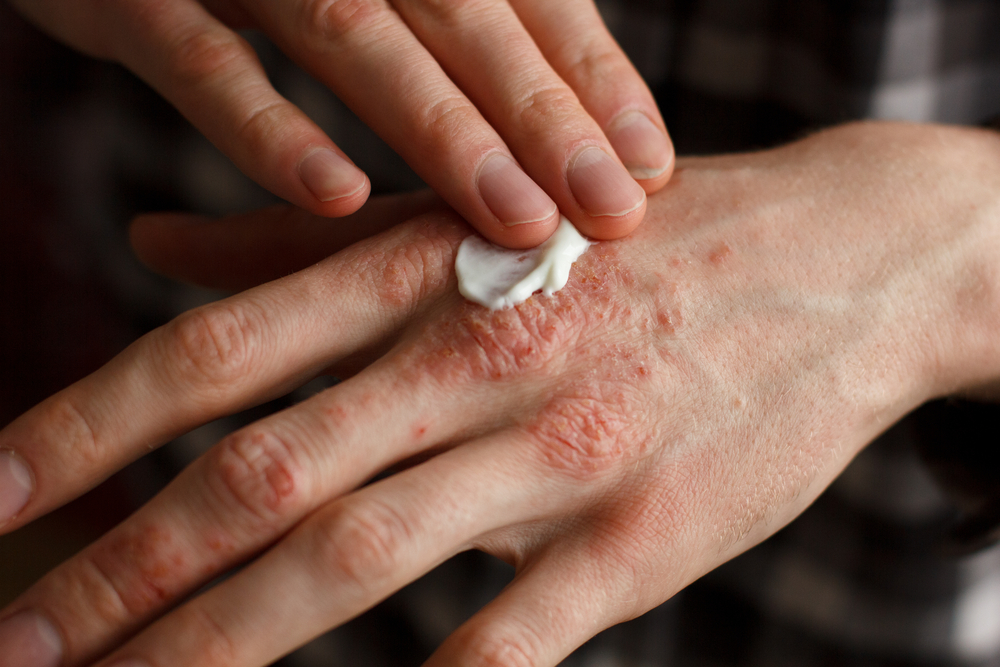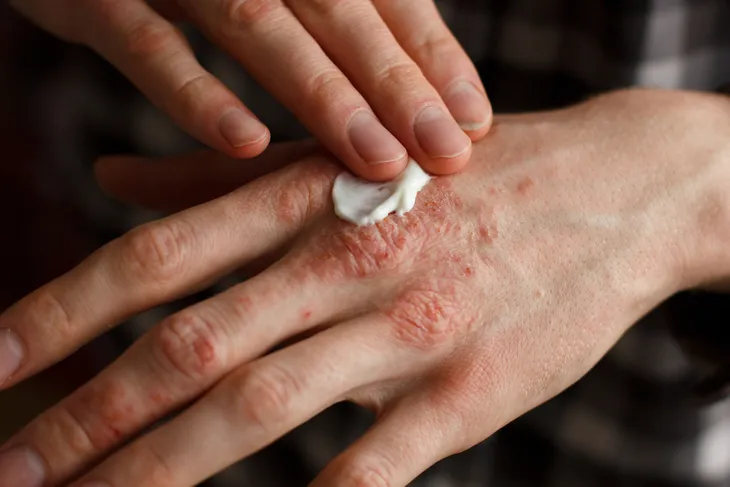Psoriasis is an uncomfortable skin condition that causes a build up of cells on the skin, typically joints, such as the knees and elbows. These extra cells turn into unattractive scaly red patches that can be itchy and even sometimes painful. Since it’s a chronic condition that comes and goes, symptoms often appear in sporadic flare ups that can last anywhere from a few weeks to a few months.
Not surprisingly, psoriasis is an extremely frustrating condition. The uncontrollable spreading of cells creates red welts with white scales that itch and shed. Thankfully, there are many treatment options available to help relieve these uncomfortable symptoms and stop the skin cells from growing so quickly. In the meantime, we’ve also got some easy tips on how to better deal with psoriasis.
Resist Scratching
This is probably one of the hardest tips to follow because wherever there’s an itch, it’s often followed by a scratch. Unfortunately people with psoriasis are not allowed to scratch or pick at their skin because it can cause tears in the skin which puts it at risk for germs and infection, says WebMD. It will also make all those uncomfortable symptoms even worse and might even cause sores to appear.
A good way to ensure you’re not tempted to scratch is to keep your nails short. If you are having a hard time resisting these urges, take an antihistamine. The American Academy of Dermatology Association (AAD) also suggests using a cold compress, applying moisturizer every day, or invest in a room humidifier. All of these solutions will help keep the skin moist which will also help reduce those uncomfortable symptoms, like itchiness, dryness, soreness, redness, and scaling.
Heal with Sunlight
Usually we’re told to keep our skin out of the sunlight, but when it comes to psoriasis the ultraviolet (UV) light can actually slow the growth of skin cells. WebMD explains that small doses of sunlight can soothe the skin, and in some cases even heal psoriasis lesions. It doesn’t have to be outdoor light, it can be light from indoors too. UV therapy is also an option, just be sure to talk to your doctor about it first. Sunlight also provides the body with vitamin D which is considered an essential vitamin.
You should aim to soak up some sun at least two or three times a week, but you still need to practice the rules of sun safety because getting too much sun can be harmful, especially if the skin gets burnt. You should always wear sunscreen and limit all exposure to 10 minutes. You can increase this exposure by 30 to 60 seconds each day. Most people with psoriasis have light or fair skin which means they are the most susceptible to burns and skin cancer. AAD warns that even a mild sunburn can worsen psoriasis or cause more to form.
Keep the Skin Moist
Unlike scratching, this tip should be super easy to follow and it’s one of the most effective! Keeping the skin moist will help encourage healing while also reducing dryness, itchiness, soreness, redness, and scaling, says WebMD.
Choosing a moisturizer is something that is unique to each person. You’ll want to base it off how dry your skin is. If the skin is really dry, choose an ointment that is heavy, thick because it will be better at locking in moisture. Lotions that are thin get absorbed much easier. Of course, there are also creams that fall somewhere in between, so if that’s what is needed, feel free to go that route too. Just be sure to choose one that doesn’t have any fragrance because this might just further irritate the skin.
Reduce Stress
Like most things in like, stress can make psoriasis worse! We know, it’s hard to just turn off stress. The best thing to do is to just take it easy. For many people, their first major psoriasis breakout was around a stressful event in their life, says WebMD. It might be possible to lower the symptoms by lowering your anxiety. People who are less stressed will also notice that their immune system is stronger, which means they can better fight off infections that could trigger flares.
Some tips on how to lower stress would be to lean on your family and friends as a strong support system. Take time for yourself throughout the day to exercise and relax. Try things like yoga, meditation, or even deep breathing. Other things that might help with stress are eating a healthier diet, drinking lots of water, and getting more sleep.
No Smoking or Drinking
Research has found that smoking and drinking can worsen the symptoms and cause flares. A lot of psoriasis drugs are dangerous when combined with drinking. You don’t have to stay away from alcohol entirely, just limit it to 1 drink a day for women and 2 for men, says WebMD. There are so many great benefits to limiting alcohol, including less psoriasis because the treatment is more effective, increased remissions, reduced risk of psoriatic arthritis and fatty liver disease, as well as reduced liver damage, explains AAD.
If you need help quitting smoking, talk to your doctor. WebMD points out that for some people, nicotine patches make their psoriasis worse. AAD also notes that quitting smoking has numerous benefits like reducing the risk of heart disease, blood vessels, liver, and gum disease. You will also lessen the chance of developing any autoimmune diseases, have fewer psoriasis flare ups, less palmoplantar psoriasis, and increase remissions.
Search for Potential Treatments
Psoriasis will not go away on its own, even when it’s in remission, it’s only a matter of time before it comes back. You should always have a plan of treatment in place. Treatment for each person will vary depending on the severity of their symptoms and the area of skin that is affected. There are so many different treatments available for psoriasis, including topical solutions, oral and injectable medications, and new cutting-edge advancements are being released all the time.
The gold standard is topical steroid creams and ointments that your dermatologist can prescribe. Ultraviolet light therapy can help to treat more diffuse psoriasis, and then move onto stronger treatments if necessary. The Mayo Clinic points out that patients with pustular or erythrodermic psoriasis will usually need to start with systemic therapy. We encourage everyone to do their own research to find out what’s available and then determine what the most effective treatment will be for you.




